
“Just Do It.”
What’s the first thing that came to your mind when you read that?
Nike. Right?
Launched in 1998, Nike’s “Just Do It” campaign shared the fitness journeys of professional and amateur athletes. One of the first advertisements of the campaign featured an 80-year-old marathoner, Walt Stack, who ran 17 miles every morning. Stories like Stack’s emotionally connected with viewers brought out an underlying question, “if these athletes can do it, why can’t I?” Decades later, this campaign still holds value.
Every marketer aims to create effective marketing campaigns. The key lies in evoking a positive customer response. Before we get into how this emotional connection can be created, let’s discuss the optimal platform to run marketing campaigns on, in 2020.
WhatsApp Business: The Opportunity
WhatsApp has a massive reach. More than 2000 million people, across 180 countries, use WhatsApp for personal and business interactions. WhatsApp currently doesn’t run ads and charges business for every message sent, unless the customer messages them first. Business responses to a customer query within 24 hours are free!
The platform creates huge value for brands. WhatsApp enables businesses to engage with users instantly and easily on a platform they’re comfortable with. Moreover, WhatsApp Status alone has more than 450 million daily users. Beyond just the scale of its user base, there are several features, rich media capabilities (videos, documents, gifs, etc.) and strategies marketers must use to increase revenue and boost conversions.
Lately, forward-thinking brands have been incorporating various strategies to engage customers on WhatsApp. The app has proved to be very useful for customer service, one-on-one communications, and paved the way for some unconventional marketing campaigns.
Here are some of the best WhatsApp strategies that have been used by industry leaders to run successful marketing campaigns.
Make your customers’ journey smooth
Through WhatsApp messages, businesses keep their customers informed at every step. A customer placed an order? Send a live tracking link. A customer just bought your product? Send a demo video. A bag the customer was looking for is out of stock? Send customized options with similar bags or notify the customer when it’s back in stock.
Through WhatsApp messages, brands reach interested prospects, ease them through the buyer’s journey with a highly engaging messaging experience, and increase sales significantly.
Ever browsed Netflix for hours and still not found something to watch? Here’s what Netflix did to make selecting which show to watch easy for customers.

If a customer has just finished watching Money Heist and is looking for a good show to watch next, they might browse the app or text their friend for suggestions. But, Netflix makes finding the right show for customers much easier.
Once a user opt-ins to receive WhatsApp messages, Netflix starts sending them suggestions on the app. These suggestions are personalized, through the recommendation engine currently used on their platform, to ensure that they serve viewers the content they enjoy.
Make it easy for customers to reach you
WhatsApp’s 2-way communication platform makes it easy for marketers to run interactive campaigns. Businesses must use this platform as an opportunity to understand their customers’ needs, engage them, and offer unique solutions.
In 2014, a U.S.-based Mayonnaise company, Hellmann’s launched a WhatsApp campaign to connect with consumers in Chile, Brazil, Argentina, Uruguay, and Paraguay. The brand wanted to inspire new uses of mayonnaise as a cooking ingredient. They soon realized that even with thousands of ways to learn new recipes, most people didn’t know how to use the ingredients they already had to cook something.
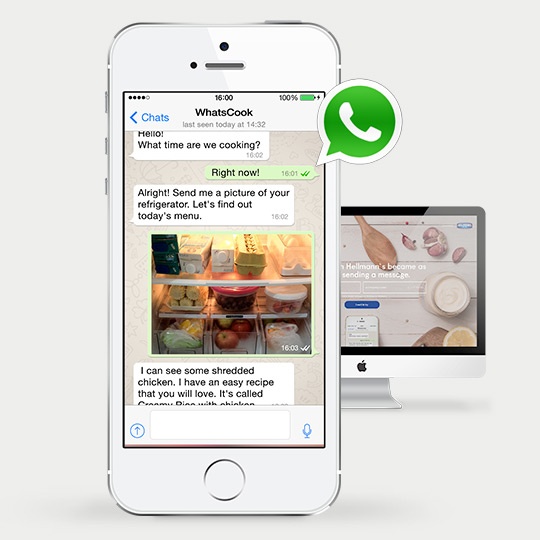
Their customers already had Hellmann’s mayonnaise at home. But didn’t know many mayonnaise-friendly recipes. With the “WhatsCook” campaign, Hellmann’s leveraged real chefs to connect with users. They enabled customers to ‘WhatsApp’ them a photo of all their ingredients. The chefs then taught them how to cook a dish that required exactly what they had at home. According to Cubo, an agency that assisted them with the campaign, more than 13,000 people signed for the campaign and the average interaction time was 65 minutes.
Offer valuable content to users on WhatsApp
Businesses must leverage WhatsApp’s features to make valuable content easily available for their users. For instance, businesses send WhatsApp statuses to inform customers about a new product line, PDFs about policy changes, and more. Customers no longer need to check their email or go to the business’s website. With this, brands provide all the relevant information to their customers on the app they already use.
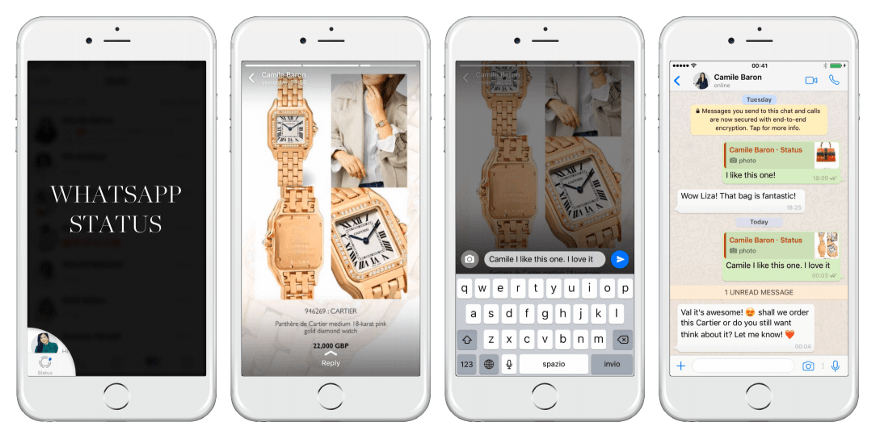
Source
Yoox, an Italian fashion company, made $80,000 from sales through Whatsapp’s platform. The brand realized that its highest-value customers are constantly on WhatsApp. So, they used the app to run a campaign that offered them an extremely personalized experience.
Rather than sending each customer pictures of their products, the marketing team started uploading all the relevant information on their WhatsApp status. Customers had a real-time, self-serve shopping experience. The brand understood the customer’s preference for the app. They enabled them to browse through products and make transactions directly from the platform, instead of logging in to their app.
Understand the customer psyche
According to Gartner’s CMO survey, companies spend 10.5% of their revenues on marketing activities. But, only a small percentage of these strategies work and increase customer retention/conversions.
Learning and understanding customer needs, preferences, and expectations are key to the success of any marketing campaign. Consumer research conducted through surveys, emails, phone interviews, etc., provide keen insights about their target audience.
WhatsApp serves as a powerful and cost-effective medium to conduct online, quantitative research. Through its platform marketers can directly ask questions to customers and gauge preferences. The ability to share documents and links on WhatsApp allows businesses to send surveys/ feed forms/ polls etc., to better understand the key factors that drive demand for their product/service.
For instance, once a customer’s query is resolved, the agent can directly send them a form on WhatsApp. This immediate feedback allows a business to determine the experience each customer has with them. Similarly, surveys can be sent as soon as a product is delivered to a customer or a service is completed.
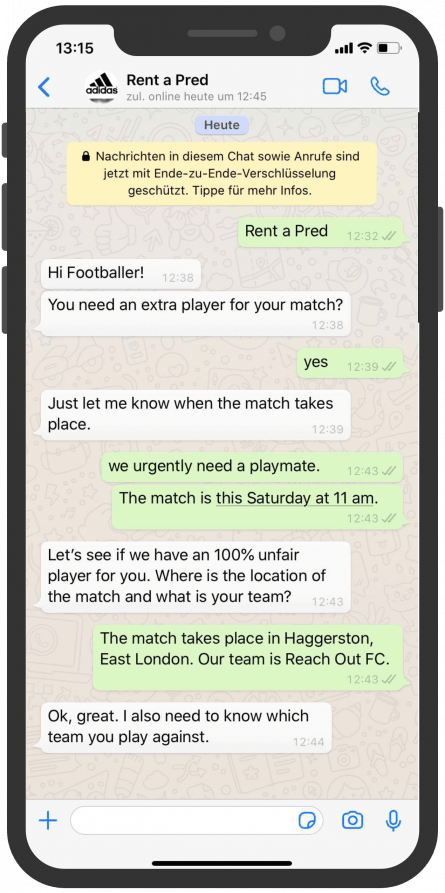
Adidas went out of their way to understand their customers’ problems and came up with a unique campaign to solve it. In an interview with Digiday, Adidas’s Managing Editor, Laura Convey, said, “We know our audience use it (WhatsApp) to share fixture info, team selection — and team-mates messaging to find last-minute replacements.” Adidas identified a common problem their customers faced – their football teammate bailing on them.
So, they launched their campaign – Rent-a-Pred on WhatsApp to help amateur teams find replacements when a teammate dropped out last minute. The replacements offered were professional athletes (including F2Freestylers, Eni Aluko, and even the legendary Kaka!), giving the hiring team an unfair advantage.
The campaign was a huge success and helped Adidas build genuine and strong relationships with a community of consumers.
Deliver quick customer support
WhatsApp serves as an end-to-end customer support channel – on web and mobile. Customers can directly send businesses a message on their WhatsApp Business phone number and ask questions or request for more information. All customer chats must be consolidated into one WhatsApp API account and connected to a messaging CRM. As a result, agents have full control over customer conversations and manage all the queries directly from the app.
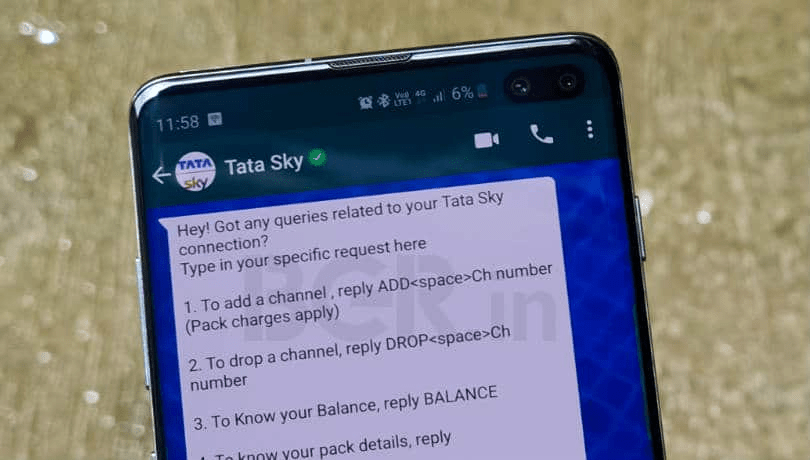
Source
WhatsApp is the most popular messaging app in India. Consider for instance Tata Sky, a household DTH provider in India, which allows customers to change account settings, check balance, add/remove channels, and more, right from WhatsApp. With this, users enjoy Tata Sky’s services without getting off their couch!
Through it’s WhatsApp campaign, Tata Sky successfully retained customers and reduced account management costs
OYO, an Indian hotel booking site, is using WhatsApp for Customer Service, allowing customers to access the hotel booking details directly on their phones. Furthermore, there is added convenience for customers. Whether it is canceling a booking, request for help finding the location, or asking for the check-out procedure, customers can get all the required information directly on WhatsApp.
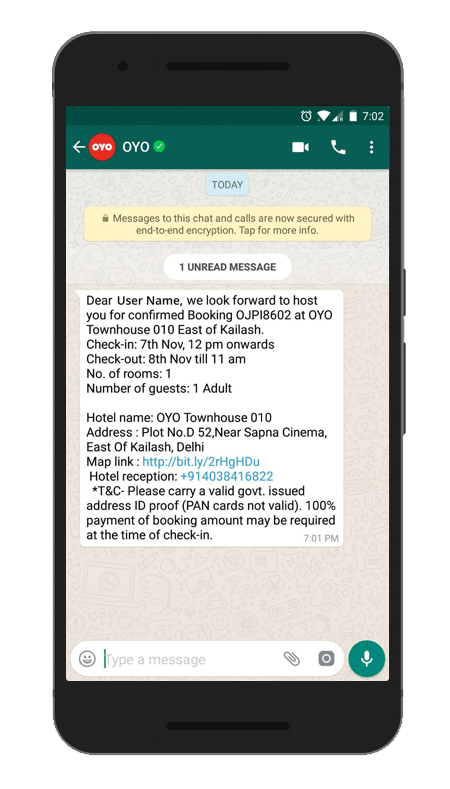
Source
To level up customer support, brands also deploy agent chat on WhatsApp that provides handy customer support on the go. When a user initiates a conversation seeking support, they are taken through a questionnaire to gather basic information about them and provide context to the agent to serve them better. Once these details are entered, the conversation is handed to a live agent, who will answer the queries. The agent can share documents, images, videos, URLs, and other types of rich media to best answer the customer’s questions.
Conduct fun and interactive activities on the platform
Today brands are vying for customer attention. An average person today sees 6,000 – 10,000 days in a single day! To stand out, brands need to offer something unique or novel to customers. Can you think of an ad that stood out to you? Or a business’s marketing campaign that you were excited to be a part of?
The names that pop-up have something in common. They are fun, unique, and engaging. WhatsApp is a platform that businesses must transform in different ways to meet their specific campaign goals. Whether it be through a trivia game or a contest, there are several ways activities that brands use to attract customers.
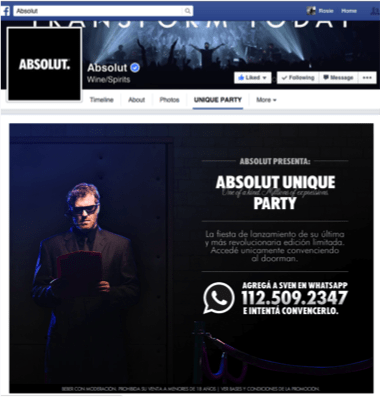
Absolut wanted to promote their limited-edition vodka bottles. So, they decided to throw a party – the “Absolut Unique Party’. The company invited A-list celebrities and reserved 2 tickets for the public.
What stops people from getting into the biggest parties? Bouncers. In the WhatsApp marketing campaign, Absolut created ‘Sven’, a virtual bouncer, who needed to be convinced by people who wanted to get tickets to its party. People sent in the funniest videos, images, and voice notes to win. The campaign created a huge buzz and had over 600 participants in just 3 days.
Take advantage of ‘groups’ on WhatsApp
Small businesses and big brands alike use WhatsApp’s group feature (with a max of 256 members) to constantly connect with customers. Brands also use these group chats to build a community with their stakeholders where they discuss common problems, answer each other’s questions about the product, etc. Another advantage of the business would be sharing prototypes in the groups and getting immediate feedback.
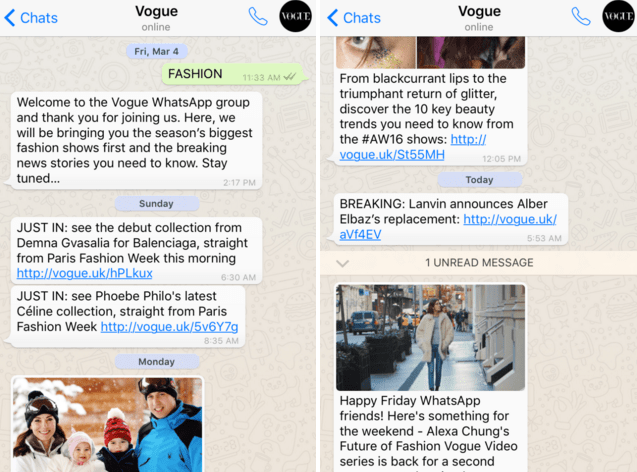
British Vogue has built group chats with prospects and customers to send them direct updates and offers. In its article announcing the WhatsApp account, Vogue said, “Joining our group means we’ll message you as soon as the creative director of Dior is announced, or the Chanel catwalk pictures go live, or the Oscars dress land on the site: no more scouring Twitter or relying on tabloids for your latest fashion fix.” The brand has also made conscious efforts to limit their posts and not flood its users’ feeds. It has benefited from a high number of sign-ups and higher user engagement through the WhatsApp campaign.
Create an attractive brand persona
Leads convert to long-term customers when they feel an emotional connection with the brand. Around 60% of shoppers said they buy from brands they trust and 21% said they purchased because they liked the brand.
Whatsapp creates a space for a brand on a conversational platform, giving it a real presence among customers. Through WhatsApp status updates, display pictures, and more, businesses reiterate their brand values. Customers are then more likely to remember the brand and connect with it. It has also become the first place a customer turns to get information about the business. WhatsApp allows businesses to add details including entity name, business hours, address, category, description, email, and website. Creating a unique business identity that serves as a familiar persona when you message customers, increases their trust in you and loyalty towards the business.
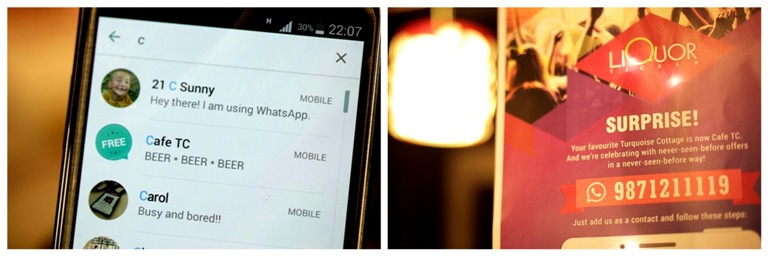
Dentsu Webchutney created a ‘WhatsApp ticker’ for Cafe TC, a popular bar in Delhi. They added a running ticker on their WhatsApp status and a GIF as their profile picture. They also took all the content from their new logo, menu, offers, etc., and put it up on the ticker. This was called the Liquor Ticker. This campaign resulted in an enormous increase in table bookings – 117% and sales shot up by 28%.
Creatively engage your community
Community engagement is an excellent way for brands to build relationships and increase brand visibility. (Almost) Everybody uses WhatsApp! So, it serves as an ideal platform to power a high-level kind of engagement.
WhatsApp allows automated messages to be personalized, depending on the business need. The app also enables businesses to communicate with customers in over 65 languages. Marketers are also able to localize their message templates accordingly to the receiving customer’s locale settings. 
On National Doctor’s day, AU Small Finance Bank and Karix Mobile devised a campaign to express gratitude to all health professionals who selflessly served the community during this global crisis. The campaign involved creating and sharing personalized e-greeting for doctors over WhatsApp.
Upon clicking the link to chat with AU Small Finance Bank on WhatsApp, users were directed to a few questions. Once all the answers were captured, Karix’s powerful framework generated a personalized e-greeting card for the user, which could easily be shared on WhatsApp and other social media platforms.
The campaign was an instant hit! AU Small Finance Bank engaged thousands of users in a single day. Easy sharing of the e-cards allowed an enormous reach which added to the success of the campaign. As a result, the bank was able to increase brand awareness and build a personal connection with customers.
When done right, marketing campaigns have a way of sticking with customers long after the impression and purchase. That’s because campaigns help make businesses memorable. They help align a brand’s efforts to guide customers to take the desired action. They help create a brand image, add personality to the brand, and evoke emotions in customers. But campaigns tend to ‘wow’ users more than the others.
To create this impact, businesses must understand their customer’s problems, find unconventional solutions, and reach them on channels of their preference. WhatsApp serves as the ideal platform that fosters a ‘business casual’ relationship between a brand and its customers. Thus, creating room for genuine conversations and moving away from a century-long push marketing. The trend in 2020 (and beyond) lies in marketing that focuses on conversations. Customer-centric businesses must identify this pattern and choose WhatsApp Business as a platform to reach the true potential of their marketing campaigns.


